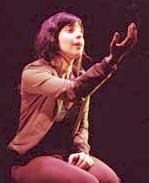SITE GUIDE
SEARCH
REVIEWS
FEATURES
NEWS
Etcetera and
Short Term Listings
LISTINGS
Broadway
Off-Broadway
NYC Restaurants
BOOKS and CDs
OTHER PLACES
Berkshires
London
California
New Jersey
DC
Philadelphia
Elsewhere
QUOTES
TKTS
PLAYWRIGHTS' ALBUMS
LETTERS TO EDITOR
FILM
LINKS
MISCELLANEOUS
Free Updates
Masthead
Writing for Us
A CurtainUp Review
Rearviewmirror
|
Look. You wanna bow down to Golden Cows, go ahead. I'm not knockin'
idolatry. I'm just saying, there are people who know what's what.
— Penn
|

Audrey Lynn Weston in Rearviewmirror
(Photo: Colin D. Young) |
Eric Winick's Rearviewmirror is a direct address piece which, oftentimes I find to be a challenging format with which to stay engaged. My mind will wander as actors sweat and overexert in an effort to draw the stragglers back in, but Carl Forsman's simple staging is utterly disarming, the ensemble beautifully balanced, and the play's language and themes gripping in scope. This is one monologue play that just dares an audience to deviate.
Loosely based on the Bacchae, Rearviewmirror explores the intertwining relationship of three searching souls. Penn (Mark Alhadeff) is a suave, tousled "film guy" who is a working PA and a dabbling screenwriter with aspirations of grandeur. The only thing that challenges his passion for film is his unshakable obsession with young Orthodox Jewish women. When he meets Agatha (Audrey Lynn Weston), an impetuous and starry-eyed young woman just returning from her first trip to Israel, he is instantly drawn in. Slowly though, she becomes more interested in Penn's world of film than her spiritual quest, and his desire for her wanes. When she gets in a heated debate with his Williamsburg film friends and is ultimately wrong, Penn's disappointment is crushing. She flees in shame and stumbles into a bar on Driggs where she meets her next fascination— musician Michael Dionne. As Agatha becomes swept up in this new craze, Penn finds it harder and harder to reach her. It doesn't take long for his eye to wander to the sensible hemline of another, Inez (Sarah Nina Hayon). She has just escaped from an emotionally abusive marriage and Penn's quick wit and passionate advances are welcome. Their tryst blossoms under the same roof where Agatha continues living as Penn's "roommate," and Inez is blissfully unaware of the complicated scene into which she has walked. The situation comes to a head when Penn gets tickets for the two of them to a Michael Dionne concert where he plans to free Agatha from the cult-like phenomenon in which she's become enmeshed.
It's debatable whether Penn causes the unfettering of these women or whether they have an equal hand, which is a compliment to this tightly knit ensemble. The overriding need of these characters to believe and to belong rule every action taken, and in the end, so do they all of us. Because of their co-existing good intention and fallibility, none can be judged too harshly.
It is the complexity and richness of character that keeps the plot of the piece from becoming cloying or trite, except for one instance in the denouement when one character speaks "from beyond the grave.""Even strong acting and interesting execution don't justify the use of this device. However, the strength of the script leading up to this misstep carries the audience through to the end.
Rachel Hauck's crisp and clean set lets the play sing. Rebecca Eastman makes compelling costume choices that make the world of each character instantly clear. Colin Young's use of a scrim to create feelings of awakening and spectacle is truly lovely.
Eric Winick knows something about the human condition and doesn't shy away from having his characters explore its intricacies. As Penn says ". . .the knowledge that this girl who's lived her life under some crazy, cockamamie system--the fact that she is ten thousand times more fulfilled than I'll ever be--it's insane. Just 'cause she believes in something--simple, pure, powerful, all-seeing. I've never known that feeling. I'm not sure I ever will." It's the fear of that void that leads everyone to seek solice and fulfillment. . .in others, religion, sex...and that keeps us looking back over our shoulder to see what is giving chase.
|
Rearviewmirror By Eric Winick Directed by Carl Forsman Cast: Mark Alhadeff (Penn), Sarah Nina Hayon (Inez), & Audrey Lynn Weston (Agatha) Set: Rachel Hauck Costumes: Rebecca Eastman Lights: Colin D. Young Sound: Ryan Rumery Running Time: One hour and 45 minutes, no intermission 59E59, 59 East 59th Street (between Park & Lexington) 212-753-5959 From 3/31/07 to 4/22/07; opening 4/5/07 Wednesday and Thursday at 7:30PM; Friday and Saturday at 8:30PM; and Sunday at 3:30PM. Additional performances on Saturday, April 14 and 21 at 3:30PM Tickets: $20 Reviewed by Betsy Winchester on April 3rd |
